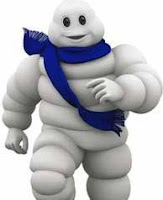Kung Fu Panda is one of my favorite movies of all time. The story amounts to a modern day CGI animated version of the Vinegar Tasters as it contrasts the essential differences between Confucianism and Taoism at the expense of Confucianism. I haven’t identified any Buddhism over- or undertones, so we’ll only discuss the difference between the portrayals of Confucianism and Taoism.
“Whaaaaa?!?!” say those who have seen the movie. There is absolutely no story line about Confucianism, Taoism, Poohism or any kind of -ism.
Ahh, but alas. Kung Fu Panda is distinctly a story of the dichotomy of Confucianism and Taoism, and is indeed very much like the Vinegar Tasters.
Kung Fu Panda is the story of Po: a fat, clumsy panda bear who is something of an anti-hero. Po is the farthest thing from a Kung Fu hero, yet he is probably the biggest devotee of Kung Fu in, as he says, “the history of Kung Fu.” Yet, the very wise – and very Taoist – Kung Fu Master Oogway declares unexpectedly that Po is the Dragon Warrior: the legendary Kung Fu warrior Messiah who will preserve peace in their home valley.
Everyone is nonplussed, including Po, and especially his new Kung Fu teacher Master Shifu, the protégé of Oogway who represents that most strident and disciplined of Confucian martial artists.
Realizing he is the most unlikely candidate for Dragon Warrior, Po nonetheless accepts the role and trains to become the legend, in a manner not unlike my 4 year old son training for the Super Bowl. He accepts himself for what he is – a fat, clumsy panda – but struggles to convert his natural state into the acutely honed fighting machine of Kung Fu master.
Po, at this point in the story, is a reluctant kind of Taoist. He realizes that he is who he is, and that he is unlikely to change. Before he was declared the Dragon Warrior he was less concerned about his condition, abilities and intellect and more or less accepted who he was out of default. More like, “this is as good as it gets.” Still he yearns to enter the realm of Kung Fu master.
Master Shifu, having trained China’s greatest warriors through years of rigorous, repetitive, physical, intense training embodies all the principles of Confucianism. Harmony, or the mastery of Kung Fu, in his world requires rules and order. It is a practice that has been quite successful in his life, and he is considered the best Kung Fu teacher in all China. Oogway has assigned Shifu the task of molding Po into the Dragon Warrior. Predictably, Shifu takes the lumpy clay that is Po and attempts to mold him in the way he knows best.
Therefore, a clash emerges when the irresistible force of Shifu’s Confucian methods meet the immovable (literally) object of Po’s talentless, gelatinous girth (his Taoist, natural state).
But the real struggle is not between the Po the pupil and Shifu the master. It is actually between the pure Taoism of Master Oogway and the essential Confucianism of his protégé pupil Master Shifu. Oogway compels the resistant Shifu to accept Po for what he is and allow him to blossom into the Dragon Warrior, a notion that defies everything Shifu knows about Kung Fu.
In this clash we see the modern day portrayal of the Vinegar Tasters (minus the Buddha). In this conceit, it is Shifu who reacts bitterly upon tasting the vinegar. He is Confucius. Oogway is Lao-tse, smiling sweetly because the vinegar – or as the painting suggests, the Essence of Life – is being what it is supposed to be. Vinegar is bitter and the Taoist Oogway recognizes it as such, so he smiles pleasantly.
The Essence of Life is Po.
I am not attempting here to oversimplify spiritual creeds and practices of three great philosophies in a few mere brilliantly pithy sentences, but to describe the painting that is allegorical to the movie Kung Fu Panda, which is allegorical to the theme of this blog– the Marathon and Big Thing – which is allegorical to life.
I am also not trying to convert anyone to Taoism. I’m not even a Taoist, but the philosophy is not without merit and there is much we all can learn from it. In fact, throughout this blog, I will cite Kung Fu Panda when the basic tenets of Taoism (or Poohism, or in this case Po'ism) expressed in Po’s story relate directly to the Big Thing.
Indeed.







